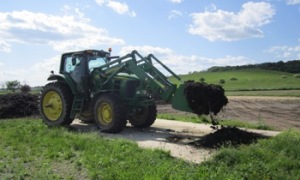 According to research by the Rodale Institute—leaders in research about organic farming—organic methods can provide a powerful tool to reduce global warming.
According to research by the Rodale Institute—leaders in research about organic farming—organic methods can provide a powerful tool to reduce global warming.
The report Regenerative 21st Century Farming: A Solution to Global Warming, authored by Dr.Timothy LaSalle, Rodale Institute’s CEO, and Dr. Paul Pepperly, Research Director, According to the report “organic practices, sometimes referred to as regenerative farming, can remove about 7,000 pounds of carbon dioxide from the air each year and sequester it in an acre of farmland.Thus, if all 434 million acres of American cropland was converted to organic practices, it would be the equivalent of eliminating 217 million cars–nearly 88 percent of all cars in the country today, and more than a third of all the automobiles in the world.”</i>
Download the report www.rodaleinstitute.org/files/Rodale_Research_Paper.pdf here, and if you’re wondering if organic methods could actually yield our nation’s farm harvest reliably, it can. Read more on this and the institute’s research on famine prevention on famine prevention www.rodaleinstitute.org/famine_prevention if you’re wondering how.
While Monsanto and other chemical agribusiness interests want you to believe that high-input farming is the way to solve the world’s food problems, that just isn’t true. In fact, as more and more pesticide-resistant predators develop, more and more inputs are needed and the corresponding costs of farming go up and up and up. Leading of course to higher food costs and more hunger on the planet.
For another take on the food shortage a story in Grist gristmill.grist.org/story/2008/4/26/194611/395 examines the impact of free market commodity trading and makes the case that there is no food shortage, but just a price crisis that makes food staples increasingly out of reach for people in impoverished nations.



